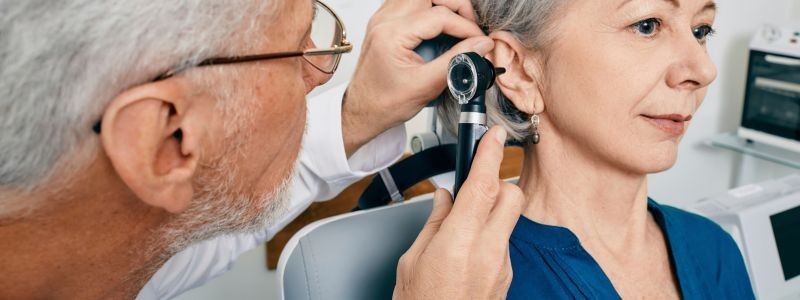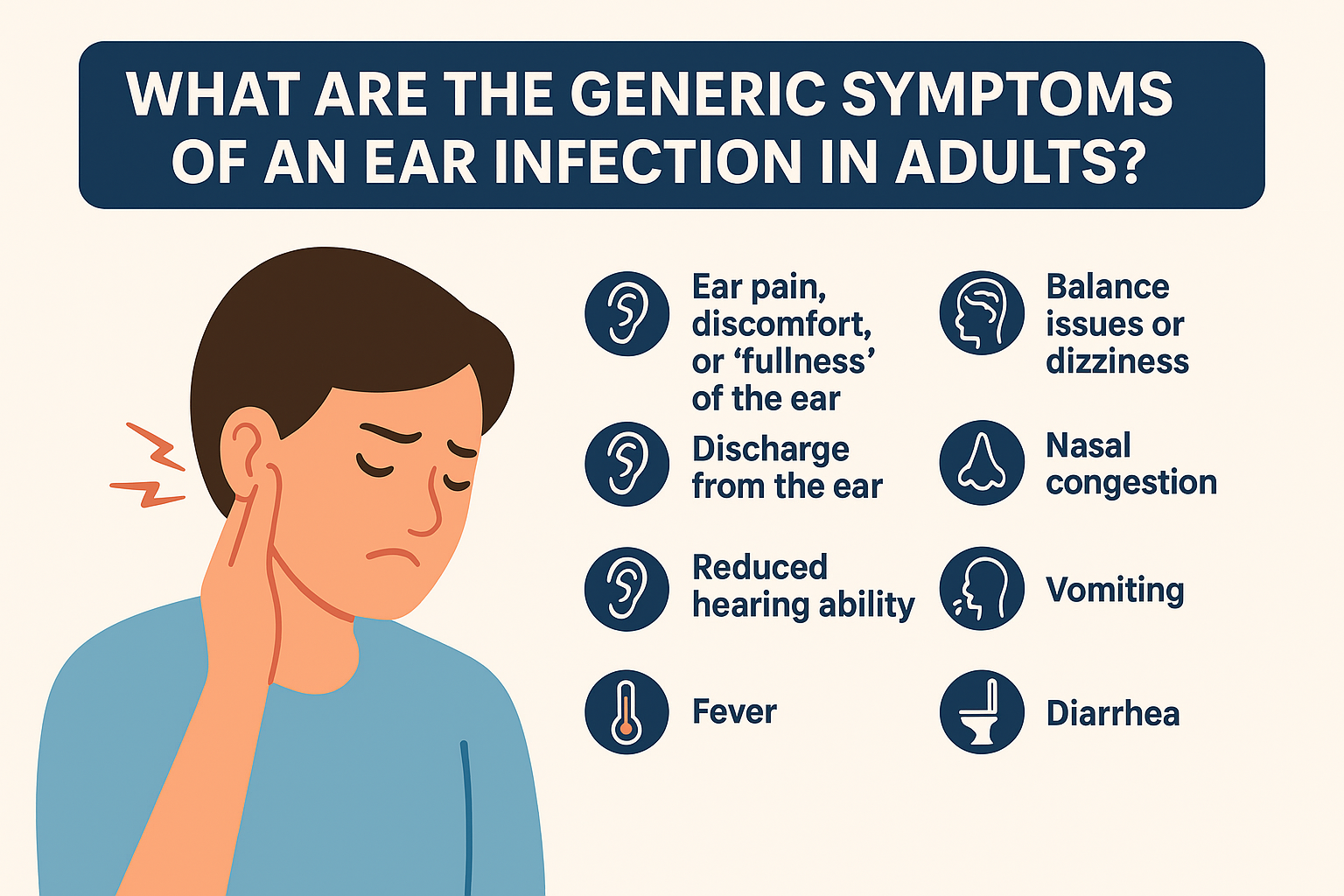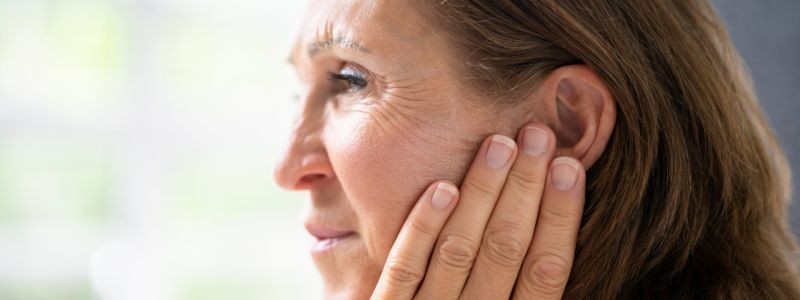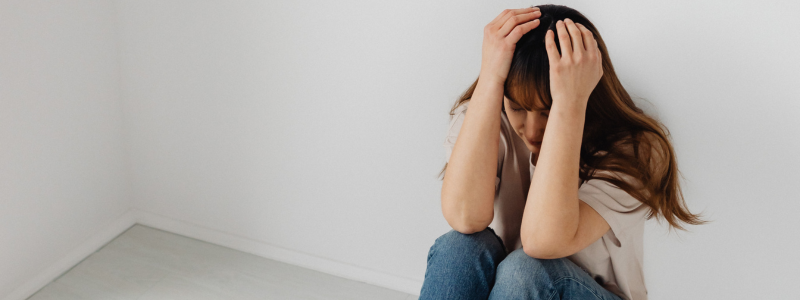
Head of Online Medical Content

Audiology Expert

Hearing Aids and Ear Infections
What is an ear infection and could my hearing aids cause it?
Overview | What is an ear infection? | Ear infection symptoms and causes | Inner ear and outer ear infections | Hearing aids and ear infections | Preventing ear infections | Managing ear infections | Conclusion
Last Hearing Aid UK Update:
Ear infections
Ear infections, also known as otitis, are a common illness that affects many worldwide and are often caused by bacteria or viruses. It typically results in pain, fluid buildup, and sometimes hearing loss.
Common in children, symptoms include ear pain, fever, and irritability. Treatment for ear infections usually involves antibiotics or pain relievers.
Here, we briefly talk about the various forms of ear infections, their connection to hearing aids, symptoms, causes, prevention strategies, and how to manage them effectively.
If you wear hearing aids and you're experiencing ear discomfort, it's natural to worry that your aids might be causing problems.
The reality is more nuanced - whilst hearing aids don't directly cause ear infections, understanding the connection between them is important for keeping your ears healthy and comfortable.
What is an ear infection?
An ear infection is an inflammation of the ear. They often occur when bacteria or a virus infect the space behind the eardrum, causing irritation and pain. For those with hearing loss who wear hearing aids, the risk of developing ear infections may increase.
Though wearing hearing devices does not directly cause ear infections, moisture build-up, and improper cleaning of devices can. This is due to bacteria living and growing on the hearing aids.
Ear infections are especially common among children, but, in reality, can affect those of any age. The symptoms often present themselves suddenly and can last up to seven days once a treatment, such as antibiotics, has been prescribed.
It is important to seek treatment as soon as symptoms develop. If left untreated, the infection could spread. In severe (although rare) cases, this can spread to the bone and cause abscesses, permanent damage to the ear, and hearing loss through the narrowing of the ear canal.
Related reading: Types of hearing loss
What are the generic symptoms of an ear infection in adults?
- Ear pain, discomfort, or ‘fullness’ of the ear
- Discharge from the ear
- Reduced hearing ability
- Fever
- Balance issues or dizziness
- Nasal congestion
- Vomiting
- Diarrhea
If you're experiencing several of these symptoms together, particularly pain and discharge, don't try to manage it yourself - prompt treatment prevents complications and gets you back to wearing your hearing aids sooner.

Middle ear infection causes and symptoms
This is a common type of ear infection, known as Otitis Media. It affects the air-filled space behind the eardrum, housing the tiny vibrating bones called ossicles. This infection occurs when fluid becomes trapped behind the eardrum, often as a result of colds, flu, or allergies.
Upper respiratory issues, such as sinus or throat infections, can also contribute to the development of middle ear infections.
Eustachian tubes connect the middle ear to the back of the throat and the nasal passages, helping to regulate air pressure in the middle ear. Middle ear infections can cause these tubes to swell and stop natural drainage. The trapped fluid in the tubes can accumulate in the middle ear, leading to infection of the middle ear.
The typical signs to look out for include ear pain, difficulty hearing, pressure in the ear, discharge from the ear, and sometimes fever. Middle ear infections are particularly common during the UK winter months when colds and flu are circulating.
If you're a hearing aid wearer and you develop a cold, being extra diligent about ear hygiene can help prevent complications.
What is an inner ear infection?
An inner ear infection, also known as labyrinthitis, occurs when the labyrinth deep inside the ear becomes inflamed. This could also be caused by a virus, bacteria, congestion after a cold, or when a middle ear infection spreads.
This inflammation can interfere with the transmission of sensory information from the inner ear to the brain. It is this interruption that may lead to symptoms associated with labyrinthitis and also worsen the effects of hearing loss.
Labyrinthitis often causes significant dizziness and balance problems alongside ear symptoms - if you're experiencing this combination, it needs prompt medical attention.
Outer ear infection, causes, and symptoms
Outer ear infection, also known as Otitis Externa or Swimmer's Ear, is an infection that extends from the ear canal entrance to the eardrum. It develops when water remains in the ear after activities like swimming or bathing, creating an ideal environment for bacterial growth.
Bacterial infections in the outer ear can also occur if the skin is scratched or irritated, highlighting the importance of not inserting objects into the ear.
Typical symptoms of an outer ear infection include ear pain, tenderness, redness, and swelling. Such infections can cause discomfort and swelling in the ear canal, which can interfere with the fit and comfort of hearing aids.
Outer ear infections may also affect hearing quality, making the use of certain hearing aids uncomfortable. These symptoms can persist for several days or even weeks. This is the type of ear infection most commonly associated with hearing aid wear, particularly in humid weather or if you're prone to sweating.
The good news is that it's usually the easiest type to prevent with proper hearing aid hygiene.

Why do my hearing aids give me an earache?
Is there a link between hearing aids and ear infections?
Are those with hearing aids more likely to get ear infections?
Hearing aids, essential for those with hearing loss, can’t directly cause ear infections, but can contribute to them if not properly maintained. When hearing aids are not inserted in the ear correctly, they might leave your ears irritated and cause pain.
If you are experiencing pain with new hearing aids, it is important to remember that it does take time to adjust to them. This is known as hearing aid newness. For tips on how to adapt to new hearing aids, please read our guide here.
Factors linking hearing aids to ear infections include:
- Moisture build-up: Sweat, humidity, and moisture can accumulate in hearing aids, creating a breeding ground for bacteria.
UK weather is particularly challenging for this - damp autumn and winter days combined with heated indoor environments create ideal conditions for moisture problems.
- Excessive earwax: Improper cleaning of hearing aids can lead to the build-up of earwax, which can trap moisture and harbour bacteria.
Hearing aids can actually stimulate earwax production as your ear tries to protect itself from what it perceives as a foreign object. Regular professional cleaning helps manage this.
- Fit and comfort: Ill-fitting hearing aids can cause irritation or pressure in the ear canal, potentially increasing the risk of infection. Make sure you contact your audiologist, who will be happy to help you with a better fitting and placement.
A properly fitted hearing aid shouldn't cause any discomfort at all. If you're experiencing soreness or pressure, that's your cue to get the fit checked - don't wait for it to develop into an infection.
Related reading: All about earwax
Causes of ear infections
Several factors can contribute to the development of ear infections, including:
- Bacterial or viral infections: Common colds, respiratory infections, or allergies can lead to the blockage of the eustachian tube, causing fluid build-up and infection.
- Anatomy: Children, in particular, have shorter and more horizontal eustachian tubes, making them more prone to infections.
- Allergies: Allergic reactions to environmental factors such as pollen, dust, or pet dander can trigger inflammation and lead to ear infections.
UK pollen seasons run from early spring through late summer, with different plants peaking at different times. If you notice ear problems coinciding with hayfever symptoms, managing your allergies can help prevent ear infections.
Preventing ear infections in hearing aid wearers
Prevention is key to reducing the risk of ear infections, especially for those who rely on hearing aids. Here are some effective prevention strategies for hearing aid wearers:
- Proper cleaning and maintenance: Regularly clean and disinfect hearing aids using manufacturer-recommended methods and products.
Ensure thorough drying to prevent moisture build-up. If you are prone to bacterial infections, this could include a UV light dryer for added protection.
Daily cleaning takes less than two minutes but makes an enormous difference. Think of it like brushing your teeth - it's a small daily habit that prevents bigger problems.
- Cleaning resources: Learn how to properly maintain and clean your hearing aids at home here.
- Ear hygiene: Maintain good ear hygiene by gently cleaning the outer ear with a washcloth and avoiding using cotton swabs, which can push wax deeper into the ear canal.
Clean the visible outer ear only - your ear canal is self-cleaning and doesn't need your help beyond professional care when necessary.
- Regular check-ups: Schedule routine check-ups with an audiologist to ensure proper fitting and function of hearing aids. They can also inspect for any signs of infection or irritation.
Even if your aids seem fine, six-monthly checks catch small problems before they become bigger ones.
- Avoid irritants: Minimise exposure to environmental irritants such as cigarette smoke, allergens, and pollutants, which can exacerbate ear inflammation.
- Avoid allergens: Look for hypoallergenic hearing aid materials for earmoulds and avoid using harsh chemicals to clean the hearing aids.
Should I wear my hearing aids if I have an ear infection?
Even if you take all preventive measures, those using hearing aids may still experience ear infections. Audiologists recommend not wearing your hearing aids when suffering from an ear infection.
This is because swelling and sensitivity in the ears can intensify the symptoms and cause further discomfort when wearing the devices. Hearing aids can obstruct proper ventilation, which is helpful for the ear's recovery.
There may be discharge from the ears, which hearing aids can cause; it then builds up and can cause excessive earwax. This is because your body produces more of it in an attempt to naturally clear the infection.
We know this advice is frustrating - going without your hearing aids even for a few days can feel isolating. However, continuing to wear them when you have an infection typically prolongs the problem, meaning you're without them for longer overall. A few days' break now prevents weeks of discomfort later.
Can I use eardrops if I wear hearing aids?
Ideally, don’t use eardrops at the same time as wearing hearing aids (unless instructed otherwise by your audiologist or health care practitioner). The hearing aids can cause the moisture to stay in the ear longer than advised. This can promote the growth of bacteria in the ear, a known contributor to ear infections.
Apply your ear drops, wait at least 10-15 minutes for them to be absorbed, gently dab away any excess, and then insert your hearing aids. This timing prevents moisture from being trapped by the devices.

Managing Ear Infections with Hearing Aids
What to do if you are experiencing symptoms of an ear infection
Our recommended steps to take are:
- Seek prompt medical attention: Your GP can diagnose the condition and prescribe appropriate treatment, which may include antibiotics or ear drops.
- Take over-the-counter painkillers: Easily accessible painkillers such as Paracetamol and Ibuprofen will help to lessen the painful symptoms of an ear infection.
- Apply heat: Holding something warm against the ear, such as a heat pack, can also ease the pain. Ensure the heat pack isn't too hot before pressing it against the ear.
- Raise your head: Try sleeping on two or more pillows to aid with congestion and drainage.
- Stop wearing your hearing aids: Our audiologists would recommend temporarily discontinuing the use of hearing aids. This will help air to circulate easily and avoid further build-up, enabling the ear to heal.
If you are unsure, follow the guidance of your own healthcare professional. They will explain when it is safe to resume the use of your hearing aids.
Give your hearing aids a thorough clean while you're not wearing them - you don't want to reintroduce bacteria when your infection clears.
- Avoid inserting anything into the ear: Don’t be tempted to ‘clean’ the infection away; avoid inserting anything into the ear canal unless instructed by a healthcare provider.
Key points to remember:
- Hearing aids don't directly cause ear infections, but moisture buildup and inadequate cleaning can create conditions that promote bacterial growth.
- Most ear infections in hearing aid wearers are outer ear infections (otitis externa), which are usually preventable with good hygiene practices.
- Daily cleaning of your hearing aids takes less than two minutes but significantly reduces infection risk.
- If you develop an ear infection, stop wearing your hearing aids until it clears - this speeds recovery and prevents prolonging the problem.
- Proper hearing aid fit is crucial - ill-fitting aids that cause irritation increase infection risk. If your aids are uncomfortable, get the fit checked promptly.
- UK weather extremes (damp winters, humid summers) can increase ear infection risk for hearing aid wearers - be extra vigilant about hygiene during these periods.
- Regular check-ups with your audiologist catch small issues before they become infections, and professional cleaning removes buildup that home cleaning might miss.
Conclusion
Ear infections can pose challenges for people relying on hearing aids, but with proper understanding, preventive measures, and timely management, their impact can be minimised.
By being consistent with good ear hygiene, regular maintenance of hearing aids, and seeking prompt medical attention when needed, you can enjoy improved hearing health.
Incorporating these ear health habits not only reduces the risk of ear infections but also enhances the effectiveness and longevity of your hearing aids. By understanding the connection between hearing aids and ear infections, you can take proactive steps to safeguard your future hearing health.
You can also download the NHS ear infections white paper by clicking on the green button further down the page.
Why Choose Us?
- FREE Hearing Tests
- Best Hearing Aids and Prices
- FREE Aftercare for Life
- FREE Home Visits
- 200+ Local Audiologists
- 60 Day Money Back Guarantee
Hearing aids and ear infections
Are you suffering with an ear infection?
The first point of call for an ear infection is to contact your local GP, so they can diagnose the infection, the type, and recommend the appropriate treatment.
However, if you are looking for support with your hearing healthcare, whether in clinic or in the comfort of your own home, as we have nationwide coverage, we will have an audiologist near you.
Call us free for support and advice on 0800 567 7621
Other hearing loss awareness articles you might like...
 Hearing aid stigma
Hearing aid stigma  The impact of diet on your hearing
The impact of diet on your hearing  How to tell if hearing loss is permanent or temporary
How to tell if hearing loss is permanent or temporary Our specialist service includes:
Do not spend hundreds of pounds without getting a second opinion from us.
Please call us on 0800 567 7621
 Not only are the prices great, but the service is fantastic! Many thanks to your team.
Not only are the prices great, but the service is fantastic! Many thanks to your team.Watch the NHS video below about ear infections in adults
What's included in our hearing aid prices?
Common FAQs about hearing aids and ear infections
What should you avoid when you have an ear infection?
Do not put anything inside your ear to remove earwax, such as cotton buds. Avoid letting water or shampoo get into your ear. Refrain from using decongestants or antihistamines, as there is no evidence they help with ear infections.
What should you avoid when you have an ear infection?
Do not put anything inside your ear to remove earwax, such as cotton buds. Avoid letting water or shampoo get into your ear. Refrain from using decongestants or antihistamines, as there is no evidence they help with ear infections.
How to clean hearing aids after an ear infection?
Cleaning your hearing aids with a cloth isn't enough to eliminate all the germs and bacteria. Alcohol pads can damage the surface, so it's best to use non-alcohol-based disinfectant wipes or spray applied with a clean cloth. Ask your audiologist to recommend their preferred brand.
Other pages you might find useful
Ask the Experts
6 Morton Lane
Walkwood
Redditch
Worcestershire
B97 5QA
Latest Launch
When we refer to a product as 'Latest Launch', we mean it is the latest to be released on the market.
New
When we refer to a product as 'New', we mean that the product is the newest hearing aid model on the market.
When we refer to a product as 'Superseded', we mean that there is a newer range available which replaces and improves on this product.
Older Model
When we refer to a product as an 'Older Model', we mean that it is has been superseded by at least two more recent hearing aid ranges.
